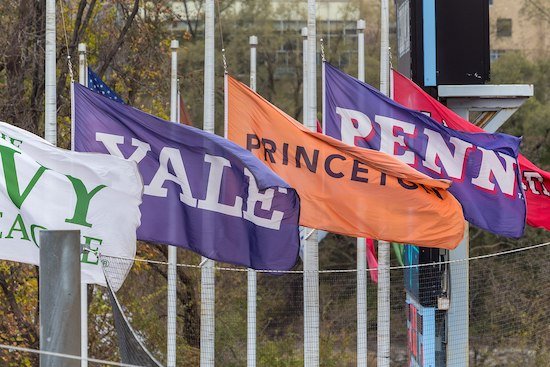I teach at a very good liberal arts college in the Northeast, and perhaps it’s one reason why I’ve been having conversations in the past few years with people I know and don’t know, in passing or in close conversation, in which I hear anger, disappointment, or confusion—expressed by affluent white people concerning their children who are not getting into Ivy League and other elite schools. Most of these people come from good families and from affluent white suburbs; their children are good students, who have worked hard, made good grades and were involved in extracurricular activities of the right kind. They expected to be rewarded. Many of them feel they have been denied admission because they are white, a response I find a bit too simple.
I have been suggesting to these friends and acquaintances that they think about the admissions process and higher education in another way. For a long time, the history of higher education has been stacked for the rich and privileged. Ivy League and elite schools have disproportionate rates of admissions for legacy students and families with money; and such students often did not have the academic records to be admitted. There were also well-known quotas for Jews at many institutions until the late 1960s, and African Americans were, for the most part, not even in the picture because they had already been eliminated from the competition by the brutal realities of segregation that defined Jim Crow America. What is it, then, that some Americans don’t understand about this—our shared history? Why do often conservatives and others resent the implementation of affirmative action and diversity policies that attempt, in a small way, to correct the gross unfairness of the American social and political system—both past and present.
The latest college-admissions scandal sheds more light on the conversations I’ve been having, and it allows for more reflections on some of these American cultural issues. The scandal is, of course, not a reflection on all privileged Americans, but it is emblematic of one version of the American way. The recently exposed scam driven by yet another American huckster-con artist, William Singer—and bought into by wealthy, white Americans—discloses even greater efforts at cheating and scamming a system that has been often tilted in favor of wealthy students and families who have the resources to hire tutors, college-admissions coaches and application-essay writers, and who have the capital to make big donations to universities in order to buy their ways in.
In this case, parents paid Mr. Singer’s college-prep organization in sum—millions of dollars—to buy into a college-admission cheating operation. Singer’s Edge College and Career Network company, also known as The Key, offered various techniques for high school students driven by their parents—to cheat on their SAT and ACT exams and to falsify their college applications. Singer’s organization paid proxies to take the exams and paid proctors to correct wrong answers; they falsified learning disability certifications for extra time, they bribed admissions officers and varsity-team coaches who agreed to admit students under false pretenses. And, while corruption in athlete recruiting has been a scandalous reality for decades, the admission of non-athlete students as athletes represents a new feat.
What the rest of the nation has seen in the William Singer college admissions scam is how normative it has become for some segment of white privileged Americans to cheat and lie in order to buy advantage and power. Cheating and scamming of course belong not only to whites. Apart from being disgusted by parents who have such contempt for education and such low esteem for their children, I’m struck by the values that these families have demonstrated, and how congruent they are with the world of Donald Trump and his culture of conning, lying, and cheating.
I want to call up some highlights of Donald Trump’s life because it may be the most dramatic example of white-privilege-cheating and lying in modern American history. The following facts have been vetted by a team of investigative journalists at the New York Times [1]. Trump claimed to be handed a million dollars in 1970 by his real estate mogul father Fred Trump in order to start his own commercial real estate empire. Father Fred Trump had made a fortune in commercial real estate and his business practices were known to be shady, especially in evading taxes through elaborate schemes of manipulating property values, and false front-money laundering. Not only did he create dubious schemes to get government funds to build low-income housing, but he was taken to court in a class-action suit for racial discrimination practices. Donald, who was now working with his father in 1970, hired Senator Joseph McCarthy’s ruthless lawyer Roy Cohn to defend the Trumps against a discrimination class-action suit, which in the end they lost.
Donald Trump’s business malpractices superseded his father’s in the extent of tax dodging, property value fraud, and the creation of false companies to siphon cash from the Trump empire, again to avoid taxes. Donald’s flagrant non-payment of contractors and suppliers is a tawdry example of exploiting the weak and vulnerable. Donald and his father defrauded the IRS out of hundreds of millions of dollars. He founded an operation called Trump University, which defrauded hundreds of people who then filed class action lawsuits, which Trump settled for $25 million just after being elected. Various Trump towers around the world became sites of money laundering and gambling rings for kleptocrats and oligarchs. His Trump Foundation turned out to be a way to enrich himself. Even the money he paid to porn movie actresses and Playboy models was laundered by his personal lawyer Michael Cohen. His road to power has been built on cheating and its attendant cohort—lying.
Trump’s dishonesty is habitual—both banal and legendary. The latest tabulation of Trump’s lying and untruth telling according to The Washington Post and Politico registers over eighty-five hundred—obviously unprecedented in American life. He lies weekly without compunction, and without, it seems, awareness of his destructiveness to national life and democracy. It’s significant that he has lied about his life story in ways that are so flagrant the story comes to mock itself in ways that are irony-topping. Far from being a self-made billionaire who took a loan of a million dollars (which he claims to have paid back) from his father to build a ten-billion-dollar real estate empire, he accrued 413 million (in today’s dollars) from his father’s empire starting when he was a toddler. And to quote the New York Times’ investigative piece “much of the money came to Mr. Trump through dubious tax schemes he participated in during the 1990s including instances of outright fraud.” He made numerous disastrous business decisions (Trump Shuttle, the Plaza Hotel, the Atlantic City Casinos for example) only to be bailed out time and again by his father, who often used schemes of scam and deception to do so. He even tried to alter his father’s will at the end of his father’s life in order to help himself at the expense of his siblings. I note all this because my focus on the college admissions scandal of the winter of 2019 is about white privilege and cheating. And Trump seems to be the President of this American way.
Fittingly, Trump was elected in part by a segment of the nation that applauded his scoffing at rules and decorum, undermining democratic values, government process and legislative procedures, and the oath of office; abusive, sexist and racist language to journalists, public figures, rival candidates and politicians, whole segments of the nation; documented sexual predatory behavior; racist comments; derisive assaults on the FBI, CIA, DOJ, the Military, drew applause from much of the Trump base.
The William Singer scam is an inventive addition to a long history of white cheating, and a history that one might note began in this country with the institution of Slavery and the theft of Native American land. It’s not the only part of the American way of life, but it is one part. Anyone who has read Mark Twain’s The Man Who Corrupted Hadleyburg, Herman Melville’s The Confidence Man, Nathaniel West’s A Cool Million, or Tom Wolfe’s Bonfire of the Vanities has read a few of many critiques and exposés of this arc of the American Way.
Cheating, lying, and scamming are not bound to party affiliations. Who knows the politics of the families in this scam ring? However, the dovetail with the leadership of Trump in the White House remains significant. Conservative journalist and commentator David Brooks, who has written passionately about Trump’s corrosive effect on both the Republican Party and American democracy, has called Donald Trump among other things—“a performative narcissist.” The public affect of Trump’s narcissism is pertinent to the current ethos at work in the college admissions scandal—an ethos that is so lost in self-absorption that even the college applications of seventeen-year-old high school students can become a racketeering operation.
And, on the related issue of higher education and the Presidency, it’s significant that Trump has threatened legal action against any of the schools that he attended and The College Board if they disclose his academic records. According to his former personal attorney Michael Cohen, President Trump is terrified about having his high school and college academic records revealed to the public, and he directed Cohen “to threaten his high school, his colleges (Fordham University and University of Pennsylvania) and the College Board to never release his grades or SAT scores.” Such paranoid efforts of unnecessary coercion (the law prohibits colleges from releasing students’ grades), reveal what seems to be the truth about Trump’s academic qualifications and performance.
Given the issues of leadership and ethics on stage here, the contrast with some previous Presidents is also instructive. Both Presidents Clinton and Obama made their ways to and through their educations on their high intelligence, discipline, and hard work. They were born into families with no financial recourses or social capital. They got into their colleges (Georgetown and Claremont McKenna and Columbia) and graduate schools (Yale and Harvard law schools) the honest way, with exceptional talent—talent that enabled them to rise above the privileged sector of America who already had an inside track. President Clinton was a Rhodes Scholar and President Obama achieved perhaps the highest academic distinction in the nation by being voted President of the Harvard Law Review. Congruently, for one part of the nation, at least, the integrity and ethical conduct of President Obama—many have described it as squeaky clean—still inspires young and old to think about the virtues of honesty, restraint, decency and fairness.
In the end, one fundamental outcome of this kind of contempt for fairness remains: the more cheating and scamming done by rich people, the wider the gap between rich and poor gets, and the further behind fall the hard-working, meritocratic citizens who get cheated out of a fair chance to pursue their dreamed-of futures.
—Posted: May 9, 2019
1. David Barstow, Susanne Craig, Russ Buettner, “Trump Engaged in Suspect Tax Schemes as He Reaped Riches From His Father,” New York Times, October 2, 2018.
Peter Balakian
Peter is the author of eight books of poems including Ozone Journal, which won the 2016 Pulitzer Prize for poetry, and the recently published No Sign (2022). His memoir Black Dog of Fate won the PEN/Albrand Award; and The Burning Tigris: The Armenian Genocide and America's Response was a New York Times Best Seller. He is Donald M. and Constance H. Rebar Professor of the Humanities in the Department of English at Colgate University.








